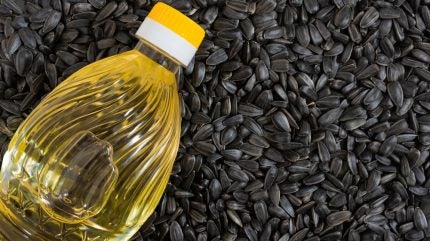
India has lowered the import tax on crude cooking oils such as sunflower in a move welcomed by the local industry association.
The country’s finance ministry has cut the import tax from 20% to 10% for crude sunflower and by the same percentile for crude palm and soy bean oils. When the so-called agri-cess tax of 5% and the social welfare cess duty are applied the effective import tax rate now stands at 16.5% for all three oils.

Discover B2B Marketing That Performs
Combine business intelligence and editorial excellence to reach engaged professionals across 36 leading media platforms.
Rates on refined, bleached and deodorised (RBD) edible oils were left unchanged at 32.5% for the trio, with an effective import tax rate of 35.75% when the social welfare cess is applied.
With the changes taking effect from 31 May, the ministry said the net effective customs duty differential of 8.25% between the crude and refined oils has been increased to 19.25% in a development applauded by the Indian Vegetable Oil Producers Association (IVPA).
“This step strengthens domestic refining, protects jobs and supports value addition across the edible-oil value chain,” Sudhakar Desai, the president of the IVPA, said in a LinkedIn posting.
“A necessary measure to build resilience and balance in India’s agri-processing ecosystem. The move will help the entire sector in controlling finished goods imports into the country.”

US Tariffs are shifting - will you react or anticipate?
Don’t let policy changes catch you off guard. Stay proactive with real-time data and expert analysis.
By GlobalDataDesai was cited in the Tripura Star News online publication as saying the government tax cuts on crude edible oils will protect the “sector from [an] influx of refined oils causing capacity injury to the vegetable oil sector”.
He added: “This move will not just strengthen the domestic refining capacities of Indian refiners but also ensure a fair price to oilseed farmers and a fair price to the consumers.”
India’s government applies the agri-cess tax, or the Agriculture Infrastructure and Development Cess commonly known as AIDC, on commercial agriculture products and uses the funds raised to foster development of the industry.
Similarly, the government uses the social welfare cess to finance education, health, and social security projects.
India meets more than 70% of its vegetable oil needs through imports, according to Reuters’ coverage of the crude oil tax cuts. The country mainly buys palm oil from Indonesia, Malaysia and Thailand, while soy oil and sunflower oils are imported from Argentina, Brazil, Russia and Ukraine, the news agency reported.
The Indian government’s Department of Food and Public Distribution (DFPD) explained in a statement: “Import duty on edible oils is one of the important factors that impacted landed cost of edible oils and thereby domestic prices.
“By lowering the import duty on crude oils, the government aims to reduce the landed cost and retail prices of edible oils, providing relief to consumers and helping to cool overall inflation. The reduced duty will also encourage domestic refining and maintain fair compensation for farmers.”
India reported its latest inflation numbers in May. The headline rate measured by the consumer price index dropped 18 basis points to 3.16% in April, according to the country’s statistics office.
Food inflation fell 91 basis points to 1.78%, the lowest level since October 2021.





